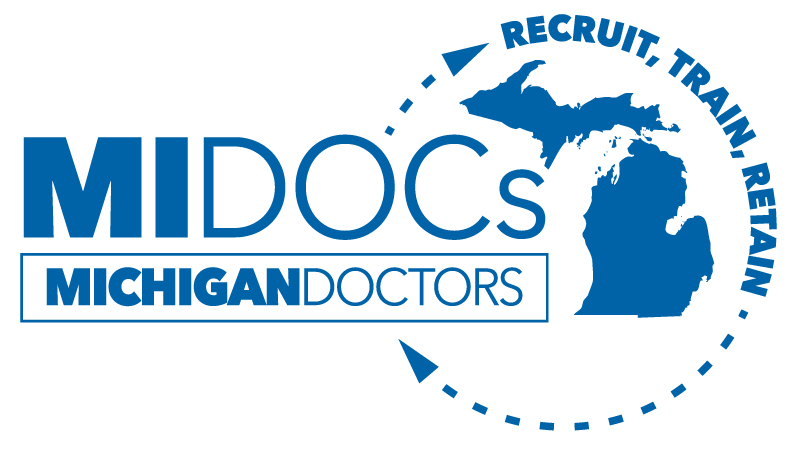MIDOCS

MIDOCS is a partnership among the state's Department of Health and Human Services and the medical schools at Wayne State University, Michigan State University, Central Michigan University, and Western Michigan University.
Of Michigan's 83 counties, 75 have at least partial designation as a primary care health professional shortage area (HPSA). The goal of MIDOCS is to recruit and retain skilled practitioners to address this physician shortage in rural and urban underserved areas in our state. It also seeks to encourage medical students to pursue careers in primary care and make a commitment to serve in a state-designated underserved community in Michigan.
For further information, see the Michigan statewide program website https://www.michigandocs.org/ for details on eligibility, service obligation, and a FAQ section. Here's a video about the program.
| Interested physicians should understand the conditions of the agreement, found in the new MIDOCS addendum (updated for 2025 applicants) to the WSUGME residency contract. Those unable to make a commitment to practice in the state of Michigan for 2 years after completing the residency should NOT apply |
As an incentive to participation, MIDOCS offers educational debt relief to those who complete training in a MIDOCs-supported residency and subsequently practice for 2 years in underserved areas in Michigan. In addition, residents must also agree to forego any subspecialty training for at least 2 years post-residency. Note: Holders of a J1 Visa waiver or an H-1B Visa are ineligible for MIDOCS.
THE MIDOCS PROGRAM IN THE WAYNE STATE UNIVERSITY SCHOOL OF MEDICINE
For AY 2025, medical students may apply for one of three training options, funded by MIDOCS:
- the Family Medicine residency program's Underserved Track
- the Preventive Medicine program
- the Internal Medicine program
All stipulations of the MIDOCS agreement apply to all three programs.
The Family Medicine Underserved Track (FM-UT)
The FM-UT is designed for physicians with a strong interest in providing primary care in our state to underserved populations in urban or rural settings and a commitment to community health. The FM-UT will include training in the following:
-
-
- the biopsychosocial model of healthcare,
- the social determinants of health and health disparities,
- the integration of behavioral sciences, and
- the psychological and social needs of patients.
-
Residents in FM-UT may elect to receive additional training, either a Master's in Public Health (MPH) or WSU's Bridge Graduate Certificate Program in Public Health. The Family Medicine program is located in Ascension Providence Rochester Hospital in Rochester, MI, a suburb of Detroit.
Contact: https://familymedicine.med.wayne.edu/residency 248 601 4900
The Preventive Medicine (PM) Program
Residents in this program will be trained for leadership roles in academic or clinical preventive medicine, healthcare management, or clinical epidemiology.
Residents in PM are required to enroll (tuition free) in the MPH program offered by the WSU's Dept. of Family Medicine and Public Health Sciences.
Contact: https://familymedicine.med.wayne.edu/preventive 313 577 1421
The Internal Medicine (IM) Program
Starting in the ERAS 2024-25 season, medical students may apply for a MIDOCS-supported residency in IM.
The IM Residency Program mission is to develop a clinical education program which trains physicians from a range of backgrounds with an emphasis on preparation for providing care in underserved (urban or rural) settings in Michigan.
To meet this goal, a variety of curricular opportunities are offered, including
- comprehensive training in general internal medicine, both inpatient and outpatient;
- provision of high quality care to diverse patient populations; and
- quality improvement initiatives that promote optimal systems-based, patient-centered care
The IM program is located in Ascension Providence Rochester Hospital in Rochester, MI, a suburb of Detroit.
Contact:IMResidency@med.wayne.edu 248 601 4805